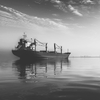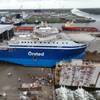Somalia Piracy Threat Unlikely to Diminish Says Analyst
Tim Holt, Head of Intelligence at Special Contingency Risks (SCR), part of the Willis Group, gives his reasons, suggest remedies.
• “Piracy is the second largest generator of income in Somalia, yielding an estimated $200 million annually.
• “As pirate financiers invest more and more in the success of their operations, lucrative opportunities for local business have vastly expanded. A $4 million ransom will be injected back into the local economy, benefiting a community that once lived in abject poverty. There is little wonder why the practice has boomed when Somali per capita income is $600 and a minimum $10,000 is available for each perpetrator of a successful operation. With 90% of the world’s trade is transported by sea, the opportunities are vast.
• “Local policing has traditionally been orchestrated by clans rather than any central authority and there are indications that this will remain unchanged in the post-transition period. Tribal elders have been asked to nominate their own MPs who are likely to be lobbied by the richest kingpins in their delegated constituencies.
• “Onshore, Somalia’s two main pirate syndicates continue to be active and show little sign of disarray. They have not had to shift anchorages and have the funds to consolidate their hold on it as necessary.
• “The pirates have the capability to adapt, and are already doing so. There has been a recent acceleration in kidnap for ransom on land of aid workers and tourists who are then transferred to the coast for ransom negotiations. Some pirates have even begun to offer their services as ‘counter piracy’ and ‘negotiation’ experts.
What the Government can do:
• “In order to tackle the problem effectively, the government would have to implement a strategy that does not solely rely on force. Communities must be presented with the opportunity to earn a wage that offers them a similar quality of life to what they currently experience. It may initiate this by a sustained investment campaign into the country’s economic infrastructure to kick-start primary sector business. Before this can happen the new government needs to establish a reliable, transparent mechanism for aid disbursement, something that will not happen overnight.
• A UN report recently stated: “Under the Transitional Federal Institutions, the systematic misappropriation, embezzlement and outright theft of public resources have essentially become a system of governance.” This highlights the extent of reform needed to turn the country around.
• However until the new government is able to ensure its internal stability, the rest of the world will have to continue its policy of damage limitation on the high seas.










